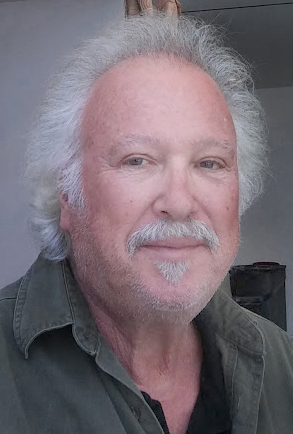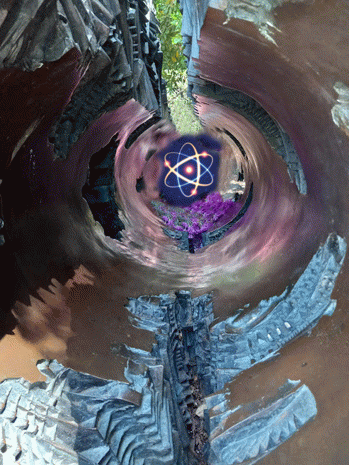If you look at the universe in a pantheistic way, where there is no personal God and all things emanate from the same universal source, then quantum physics, which is the study of how the universe works at a subatomic level, would play an important role in understanding how the universal source would be comprised of subatomic particles that transcend space and time and contain the history and wisdom of the universe. Some pantheists refer to this universal paradigm as God, but I don't, the same way Buddhists don't, because the word itself has too many preconceived religious ideas attached to it. Instead, I prefer to use Carl Jung's term, "collective unconscious."
According to Jung, humans have more than a personal consciousness, and this consciousness comes from a universal source, or as he describes it: "a second psychic system of a collective, universal, and impersonal nature which is identical in all individuals. This collective unconscious does not develop individually but is inherited." As a consequence, it is able to transfer information into a person's conscious mind (usually through the subconscious) in the form of intuition, dreams, strong feelings, or epiphanies. And this information is always beneficial because it contains the history and wisdom of the universe. Often times this information suddenly appears in one's personal consciousness without any effort, but you can also tap into the collective unconscious by meditating or using hallucinogenic drugs. According to Jung (and most Eastern philosophers), the part of the collective unconscious that comes though you is called the Self. Perhaps the most common example of this is when you have a "gut feeling" about something. Naturally there are times when you disregard your gut feeling because your Ego gets in the way and you usually end up regretting it. "I knew that was going to happen!" You chide yourself after you've made the wrong decision, but of course, it's too late.
Another example is when individuals take LSD and go on a "trip." Where do they go on this trip? Well, it's pretty obvious they're not going to Palm Springs! In point of fact, they're tapping into their collective unconscious and gaining wisdom or knowledge that is not available to them in their everyday lives. The same applies to individuals who have mastered the art of meditation. And if you combine the two within the same time frame, as I did at one point in my life, the effects can be even more illuminating and dramatic. In the early 1970s, Carlos Castaneda became an iconic figure and best-selling author of books like The Teachings of Don Juan, a Yaqui Way of Knowledge and A Separate Reality using these types of techniques.
Bear in mind that the Self is the part of the collective unconscious that is within you, but it is also without you, like the air that you breathe. And just as inhaling air changes its chemical composition from oxygen to carbon dioxide when you exhale it, the same can be said of the Self. As the collective unconscious flows through your body, its subatomic particles interact with the subatomic particles in your subconscious, which in turn reacts with your conscious mind and your Ego. Over the years, many observers have used the terms Self and Ego interchangeably, but they are actually quite different. The Ego is who you think you are based on the thoughts of others. For example, as you grow up, you're influenced primarily by your parents and your siblings, later on by your friends and associates. Naturally, you'll be influenced in both positive and negative ways. And so you develop your identity based on these experiences, some of which are quite traumatic and predetermine your personality into your adulthood. But is this identity the real You? And who is the real You? Sometimes it takes a lifetime to figure it out. Some people never do.
On the other hand, the Self is what a religious person would call the soul or the spirit that emanates from God, as if it were some translucent apparition floating in and out of one's body like Casper the Ghost. Obviously this interpretation is woefully misguided because there is nothing mystical or supernatural about the Self; in fact, it is just an amorphous field of subatomic particles traveling through your consciousness the same way the air enters your lungs.
If you've ever seen someone soon after they die, you know they don't look the same. They don't look like they're sleeping and they don't look like they're at peace. They look dead. I've personally witnessed this on several occasions. Religious people will say they look that way because their soul has left their body. But there is a better explanation, i.e., they look dead because their expired body has lost all consciousness and connection to the Self. And without this connection the physical body not only is dead but looks dead.
In the Middle Ages, most Judeo-Christian philosophers and theologians believed in a personal God and the concept of dualism, that is, a separation between the mind and body and the spiritual and physical. Of course, they could never quite make the connection between the two. Descartes is probably the most famous for trying. He hypothesized that the pineal gland, a tiny organ in the brain, is where the soul resides and is the interface between the spiritual and the physical. Needless to say, most modern day philosophers and scientists think this theory is absurd. Pantheists, (and Buddhists), of course, believe the whole idea of dualism is absurd. Yet, even today, many traditionally religious people, especially fundamentalists, still believe in this antiquated theory.
According to his writings, Einstein did not believe in a personal God, but he was in agreement with the pantheistic views of 17th century philosopher Baruch Spinoza, saying, "I believe in Spinoza's God who reveals himself in the orderly harmony of what exists, not in a God who concerns himself with the fates and actions of human beings." Many notable individuals throughout history shared this type of pantheistic view of the universe, including Marcus Aurelius, Henry David Thoreau, and Beethoven. It should be noted, however, that although Spinoza gets credit for being the "prophet" of pantheism, he didn't actually use the term. As to who coined the word itself, the honor goes to Irish writer/freethinker John Toland (1670-1722), who is called the "Father of Modern Pantheism."
In his book, The God Delusion, noted atheist Richard Hawkins refers to pantheism as "sexed-up atheism." Well, not quite, but I see what he's getting at, namely, that pantheists do not believe in a traditional "sky God," as George Carlin called him, and they take science and logic seriously. Actually Hawkins would have been more accurate if he had said that pantheism is really a "sexed-up" Western version of Buddhism, since the two belief systems have many ideas in common. For example, a pantheist (like a Buddhist) believes the world is not linear but circular. Nietzsche called it a "monster of energy, without beginning, without end." This concept also ties in nicely with quantum physics and the idea that time itself doesn't really exist, at least not in the classical sense.
But if life is a circle and there are no beginnings or ends, what happens to a person when he or she dies? What happens to the Self that once inhabited the person's body? When Khalil Gibran was asked this question, he replied: 'A moment's rest upon the wind and then I am born to another mother.' In other words, reincarnation, which could turn out as a good result for some, not so much for others. In any case, it's more optimistic than Nietzsche's gloomy concept of Eternal Recurrence where he forewarns: "This life as you now live it and have lived it, you will have to live once more and innumerable times more; and there will be nothing new in it, but every pain and every joy and every thought and sigh and everything immeasurably small or great in your life must return to you-all in the same succession and sequence-even this spider and this moonlight between the trees, and even this moment and I myself. The eternal hourglass of existence is turned over and over, and you with it, a grain of dust."
Not a very pleasant view of eternal existence! It sure makes one want to root for the idea of being able to hop off the merry-go-round of life at some point. Buddhists would argue that until you have reached enlightenment/nirvana-- or to put it in a quantum physical wayuntil your subatomic particles have become harmonious with the collective unconscious, your Self will have to come back and try again. And this may take many lifetimes until you get it right.
In The Book of Mirdad, Khalil Gibran's friend and contemporary Mikhail Naimy described it this way: "When you pass out of the cycle known as life into the cycle known as death, and carry with you thirst unquenched for the Earth and hungers unappeased for her passions, then will the magnet of the Earth draw you again to her bosom. And the Earth shall suckle you, and Time shall wean you life after life and death after death until you wean yourself, once and for all, of your own will and accord."
Is this really possible? Or is this metaphorical posturing? Personally, I have never known anyone who I would say has reached enlightenment or nirvana. But I have known a couple of people who have come pretty close. But maybe that's the idea: that it's just an ideal to strive for. Maybe even the Buddha himself didn't totally escape samsara and reach enlightenment; maybe he just came pretty close and was mythologized in Eastern culture over the centuries for having attained the ultimate ideal, the same way Socrates reached apotheosis in Western culture.
But let's say, for the sake of argument, the Buddha actually did reach nirvana. What happened to his Self after he died? And what would happen to anyone's Self who reached nirvana after he or she died? Would that person automatically get off the merry-go-round of life, as Naimy claims, and become a free spirit in the universe with no physical connection to the Earth?
From what I gather, this is what Buddhists (and some pantheists) believe. Ironically, Socrates felt pretty much the same way, maintaining that when a person reached enlightenment, he or she would become "a spectator of all time and existence." In other words, a god. By the way, it's interesting to note that Socrates lived in roughly the same time period as the Buddha (around 450 BC), and perhaps it's more than a coincidence that the most revered Eastern philosopher from India and the most revered Western philosopher from Greece came to similar conclusions about the afterlife of an enlightened individual.
(Note: You can view every article as one long page if you sign up as an Advocate Member, or higher).






